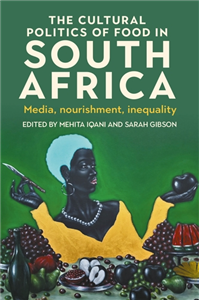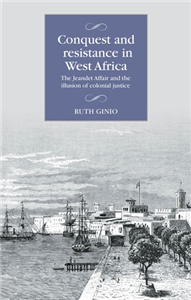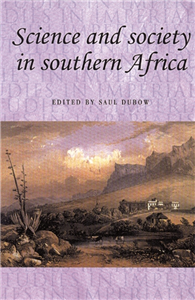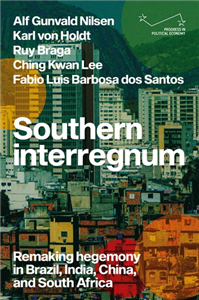Your Search Results
-
Afram Publications
Afram Publication is specialized in publishing materials for pre-school and basic education with special focus on development of local authorship especially in children’s books.
View Rights Portal
-
Promoted ContentHumanities & Social SciencesMarch 2017
Ordering Africa
Anthropology, European imperialism and the politics of knowledge
by Helen Tilley, Robert Gordon
African research played a major role in transforming the discipline of anthropology in the twentieth century. Ethnographic studies, in turn, had significant effects on the way imperial powers in Africa approached subject peoples. Ordering Africa provides the first comparative history of these processes. With essays exploring metropolitan research institutes, Africans as ethnographers, the transnational features of knowledge production, and the relationship between anthropology and colonial administration, this volume both consolidates and extends a range of new research questions focusing on the politics of imperial knowledge. Specific chapters examine French West Africa, the Belgian and French Congo, the Anglo-Egyptian Sudan, Italian Northeast Africa, Kenya, and Equatorial Africa (Gabon) as well as developments in Britain, France, Germany, Italy, and Switzerland. A major collection of essays that will be welcomed by scholars interested in imperial history and the history of Africa.
-
Promoted ContentHumanities & Social SciencesMarch 2026
The cultural politics of food in South Africa
Media, nourishment, inequality
by Mehita Iqani, Sarah Gibson
Food is both a material system of nourishment, necessary for human survival, and a communicative system that signifies multiple meanings across human cultures. This book explores the cultural politics of food in the South African context, bringing together a range of disciplinary perspectives on the links between media, nourishment, and inequality. The chapters all highlight the multiplicity of meanings that food has in South African society. These include historical perspectives on the impact of colonialism, migration and apartheid had on food and foodways in South Africa; sociological interventions on food and society; aesthetic practices in relation to food; and mediated food cultures in South Africa. Taken together, the book critically explores the multiple ways in which food is never just food, and always linked to complex and shifting modalities of meaning and knowledge in the South African context.
-
 Trusted Partner
Humanities & Social SciencesMarch 2017
Trusted Partner
Humanities & Social SciencesMarch 2017Travellers in Africa
British travelogues, 1850-1900
by Timothy Youngs
Works of travel have been the subject of increasingly sophisticated studies in recent years. This book undermines the conviction with which nineteenth-century British writers talked about darkest Africa. It places the works of travel within the rapidly developing dynamic of Victorian imperialism. Images of Abyssinia and the means of communicating those images changed in response to social developments in Britain. As bourgeois values became increasingly important in the nineteenth century and technology advanced, the distance between the consumer and the product were justified by the scorn of African ways of eating. The book argues that the ambiguities and ambivalence of the travellers are revealed in their relation to a range of objects and commodities mentioned in narratives. For instance, beads occupy the dual role of currency and commodity. The book deals with Henry Morton Stanley's expedition to relieve Emin Pasha, and attempts to prove that racial representations are in large part determined by the cultural conditions of the traveller's society. By looking at Joseph Conrad's Heart of Darkness, it argues that the text is best read as what it purports to be: a kind of travel narrative. Only when it is seen as such and is regarded in the context of the fin de siecle can one begin to appreciate both the extent and the limitations of Conrad's innovativeness.
-
 Trusted Partner
Humanities & Social SciencesJuly 2025
Trusted Partner
Humanities & Social SciencesJuly 2025Conquest and resistance in West Africa
The Jeandet Affair and the illusion of colonial justice
by Ruth Ginio
This book is an enthralling account of a legal scandal, which erupted in colonial Senegal in 1890 and reached the French metropolitan press and the parliament. The murder of a colonial administrator, Abel Jeandet, by one of his soldiers led to the brutal and illegal executions without trial of the killer and two local dignitaries. The volume follows the fascinating story of Ndiereby Ba, the widow of one of the dignitaries, who with the help of powerful métis men in the capital Saint Louis sued the French administrators who had supervised the executions for the murder of her husband. Through this captivating tale the book articulates the French expansion into West Africa, the resistance to colonial rule both violent and non-violent, and the lack of interest on the part of French politicians in the brutal conquest of a territory they know nothing about.
-
 Trusted Partner
Humanities & Social SciencesMay 2010
Trusted Partner
Humanities & Social SciencesMay 2010Representing Africa
Landscape, exploration and empire in Southern Africa, 1780–1870
by John McAleer, Andrew Thompson, John Mackenzie
Southern Africa played a varied but vital role in Britain's maritime and imperial stories: it was one of the most intricate pieces in the British imperial strategic jigsaw, and representations of southern African landscape and maritime spaces reflect its multifaceted position. Representing Africa examines the ways in which British travellers, explorers and artists viewed southern Africa in a period of evolving and expanding British interest in the region. Drawing on a wide range of archival sources, contemporary travelogues and visual images, many of which have not previously been published in this context, this book posits landscape as a useful prism through which to view changing British attitudes towards Africa. Richly illustrated, this book will be essential reading for scholars and students interested in British, African, imperial and exploration history, art history, and landscape and environment studies. ;
-
 Trusted Partner
Humanities & Social SciencesMarch 2017
Trusted Partner
Humanities & Social SciencesMarch 2017Representing Africa
Landscape, exploration and empire in Southern Africa, 1780–1870
by John McAleer, Andrew Thompson, John M. MacKenzie
Southern Africa played a varied but vital role in Britain's maritime and imperial stories: it was one of the most intricate pieces in the British imperial strategic jigsaw, and representations of southern African landscape and maritime spaces reflect its multifaceted position. Representing Africa examines the ways in which British travellers, explorers and artists viewed southern Africa in a period of evolving and expanding British interest in the region. Drawing on a wide range of archival sources, contemporary travelogues and visual images, many of which have not previously been published in this context, this book posits landscape as a useful prism through which to view changing British attitudes towards Africa. Richly illustrated, this book will be essential reading for scholars and students interested in British, African, imperial and exploration history, art history, and landscape and environment studies.
-
 Trusted Partner
Trusted Partner
-
 Trusted Partner
Trusted Partner
-
 Trusted Partner
Humanities & Social SciencesNovember 2013
Trusted Partner
Humanities & Social SciencesNovember 2013Britain and Africa Under Blair
In pursuit of the good state
by Julia Gallagher
Africa was a key focus of Britain's foreign policy under Tony Blair. Military intervention in Sierra Leone, increases in aid and debt relief, and grand initiatives such as the Commission for Africa established the continent as a place in which Britain could 'do good'. Britain and Africa under Blair: in pursuit of the good state critically explores Britain's fascination with Africa. It argues that, under New Labour, Africa represented an area of policy that appeared to transcend politics. Gradually, it came to embody an ideal state activity around which politicians, officials and the wider public could coalesce, leaving behind more contentious domestic and international issues. Building on the story of Britain and Africa under Blair, the book, now available in paperback, draws wider conclusions about the role of 'good' and idealism in foreign policy. In particular, it discusses how international relationships provide opportunities to create and pursue ideals, and why they are essential for the well-being of political communities. It argues that state actors project the idea of 'good' onto idealised, distant objects, in order to restore a sense of the 'good state'. The book makes a distinctive and original contribution to debates about the role of ethics in international relations, and will be of particular interest to academics, policy-makers and students of international relations, Africa and British foreign policy, as well as anyone interested in ethics in international affairs. ;
-
 Trusted Partner
Humanities & Social SciencesJuly 2018
Trusted Partner
Humanities & Social SciencesJuly 2018The Victorian soldier in Africa
by Edward Spiers, Andrew Thompson, John M. MacKenzie
The Victorian soldier in Africa re-examines the campaign experience of British soldiers in Africa during the period, 1874-1902 - the zenith of the Victorian imperial expansion - and does so from the perspective of the regimental soldier. The book utilises an unprecedented number of letters and diaries, written by regimental officers and other ranks, to allow soldiers to speak for themselves about their experience of colonial warfare. The sources demonstrate the adaptability of the British army in fighting in different climates, over demanding terrain and against a diverse array of enemies. They also uncover soldiers' responses to army reforms of the era as well as the response to the introduction of new technologies of war. Moreover, the book provides commentary on soldiers' views of commanding officers and politicians alongside assessment of war correspondents, colonial auxiliaries and African natives in their roles as bearers, allies and enemies. This book reveals new insights on imperial and racial attitudes within the army, on relations between soldiers and the media and the production of information and knowledge from frontline to homefront. It will make fascinating reading for students, academics and enthusiasts in imperial history, Victorian studies, military history and colonial warfare.
-
 Trusted Partner
Humanities & Social SciencesSeptember 2024
Trusted Partner
Humanities & Social SciencesSeptember 2024Settlers at the end of empire
Race and the politics of migration in South Africa, Rhodesia and the United Kingdom
by Jean Smith
Settlers at the end of empire traces the development of racialised migration regimes in South Africa, Rhodesia (present-day Zimbabwe) and the United Kingdom from the Second World War to the end of apartheid in 1994. While South Africa and Rhodesia, like other settler colonies, had a long history of restricting the entry of migrants of colour, in the 1960s under existential threat and after abandoning formal ties with the Commonwealth they began to actively recruit white migrants, the majority of whom were British. At the same time, with the 1962 Commonwealth Immigrants Act, the British government began to implement restrictions aimed at slowing the migration of British subjects of colour. In all three nations, these policies were aimed at the preservation of nations imagined as white, revealing the persistence of the racial ideologies of empire across the era of decolonisation.
-
 Trusted Partner
Humanities & Social SciencesJuly 2025
Trusted Partner
Humanities & Social SciencesJuly 2025The adventure
Violent borders, illegal migration and the uncertain quest for life in Morocco
by Sébastien Bachelet
This ethnographic exploration of irregular migration from Western and Central Africa in Morocco deconstructs dehumanising narratives of a "migration crisis" and a "sub-Saharan problem" in politics of migration. The book provides an original focus on how migrants understood and experienced their entrapped mobility. The emic notion of "the adventure" at the heart of this study sheds light on a transformative, epic quest to carve out a better life and future. The book traces how young men from Western and Central Africa sought to assert themselves as agents of their own destinies, despite uncertain, illegalising processes. In steering away from aesthetics of despair and fearmongering narratives, the book brings new insights into inter-disciplinary debates (e.g. illegality, uncertainty, immobility, violence, suffering, transit, etc.). Such focus is essential to draw out the complexity and existential depth of (irregular) migrants' lives, journeys, and stories.
-
 Trusted Partner
Humanities & Social SciencesJune 2023
Trusted Partner
Humanities & Social SciencesJune 2023Worrier state
Risk, anxiety and moral panic in South Africa
by Nicky Falkof
Risk, anxiety and moral panic are endemic to contemporary societies and media forms. How do these phenomena manifest in a place like South Africa, which features heightened insecurity, deep inequality and accelerated social change? What happens when cultures of fear intersect with pervasive systems of gender, race and class? Worrier state investigates four case studies in which fear and anxiety appear in radically different ways: the far right myth of 'white genocide'; so-called 'Satanist' murders of young women; an urban legend about township crime; and social theories about safety and goodness in the suburbs. Falkof foregrounds the significance of emotion as a socio-political force, emphasising South Africa's imbrication within globalised conditions of anxiety and thus its fundamental and often-ignored hypermodernity. The book offers a bold and creative perspective on the social roles of fear and emotion in South Africa and thus on everyday life in this complex place.
-
 Trusted Partner
Humanities & Social SciencesJune 2009
Trusted Partner
Humanities & Social SciencesJune 2009Science and society in southern Africa
by Andrew Thompson, Saul Dubow, John Mackenzie
This collection, dealing with case studies drawn from South Africa, Zimbabwe, Mozambique and Mauritius, examines the relationship between scientific claims and practices, and the exercise of colonial power. It challenges conventional views that portray science as a detached mode of reasoning with the capacity to confer benefits in a more or less even-handed manner. That science has the potential to further the collective good is not fundamentally at issue, but science can also be seen as complicit in processes of colonial domination. Not only did science assist in bolstering aspects of colonial power and exploitation, it also possessed a significant ideological component: it offered a means of legitimating colonial authority by counter-poising Western rationality to native superstition and it served to enhance the self-image of colonial or settler elites in important respects. This innovative volume ranges broadly through topics such as statistics, medicine, eugenics, agriculture, entomology and botany. ;
-
 Trusted Partner
Humanities & Social SciencesMarch 2017
Trusted Partner
Humanities & Social SciencesMarch 2017Science and society in southern Africa
by Saul Dubow
This collection, dealing with case studies drawn from South Africa, Zimbabwe, Mozambique and Mauritius, examines the relationship between scientific claims and practices, and the exercise of colonial power. It challenges conventional views that portray science as a detached mode of reasoning with the capacity to confer benefits in a more or less even-handed manner. That science has the potential to further the collective good is not fundamentally at issue, but science can also be seen as complicit in processes of colonial domination. Not only did science assist in bolstering aspects of colonial power and exploitation, it also possessed a significant ideological component: it offered a means of legitimating colonial authority by counter-poising Western rationality to native superstition and it served to enhance the self-image of colonial or settler elites in important respects. This innovative volume ranges broadly through topics such as statistics, medicine, eugenics, agriculture, entomology and botany.
-
 Trusted Partner
Business, Economics & LawJune 2025
Trusted Partner
Business, Economics & LawJune 2025Southern interregnum
Remaking hegemony in Brazil, India, China, and South Africa
by Alf Gunvald Nilsen, Karl von Holdt, Ruy Braga, Ching Kwan Lee, Fabio Luis Barbosa dos Santos
How do governing elites in the global South attempt to remake hegemony in a conjuncture of durable crisis? This is the question at the core of Southern interregnum, a comparative conjunctural analysis of hegemonic projects in Brazil, India, China, and South Africa. Working with a Gramscian notion of crisis, centred on the interregnum as an enduring period of instability and uncertainty, in which hegemonic authority erodes and competing projects for crisis resolution emerge, the book proposes a novel critical reading of the convulsions that are currently reshaping the political economy of the global South and the world-system. Mapping the variegated trajectories of elite projects to reconcile accumulation and legitimation - and probing the limits of these projects - the book breaks new ground in the study of the contemporary global South.
-
 Trusted Partner
Humanities & Social SciencesJanuary 2022
Trusted Partner
Humanities & Social SciencesJanuary 2022The Gulf States and the Horn of Africa
by Robert Mason, Simon Mabon, Edward Wastnidge
-
 Trusted Partner
Humanities & Social SciencesJune 2024
Trusted Partner
Humanities & Social SciencesJune 2024Peace and the politics of memory
by Annika Björkdahl, Susanne Buckley-Zistel, Stefanie Kappler, Johanna Mannergren Selimovic, Timothy Williams
This important book provides new understandings of how the politics of memory impacts peace in societies transitioning from a violent past. It does so by developing a theoretical approach focusing on the intersection of sites, agency, narratives, and events in memory-making. Drawing on rich empirical studies of mnemonic formations in Cyprus, Bosnia and Herzegovina, Rwanda, South Africa and Cambodia, the book speaks to a broad audience. The in-depth, cross-case analysis shows that inclusivity, pluralism, and dignity in memory politics are key to the construction of a just peace. The book contributes crucial and timely knowledge about societies that grapple with the painful legacies of the past and advances the study of memory and peace.
-
 Trusted Partner
Trusted Partner
-
 Trusted Partner
Humanities & Social SciencesMarch 2024
Trusted Partner
Humanities & Social SciencesMarch 2024Intimacy and injury
In the wake of #MeToo in India and South Africa
by Nicky Falkof, Srila Roy, Shilpa Phadke
Both India and South Africa have shared the infamy of being labelled the world's 'rape capitals', with high levels of everyday gender-based and sexual violence. At the same time, both boast long histories of resisting such violence and its location in wider cultures of patriarchy, settler colonialism and class and caste privilege. Through the lens of the #MeToo moment, the book tracks histories of feminist organising in both countries, while also revealing how newer strategies extended or limited these struggles. Intimacy and injury is a timely mapping of a shifting political field around gender-based violence in the global south. In proposing comparative, interdisciplinary, ethnographically rich and analytically astute reflections on #MeToo, it provides new and potentially transformative directions to scholarly debates this book builds transnational feminist knowledge and solidarity in and across the global south.






















